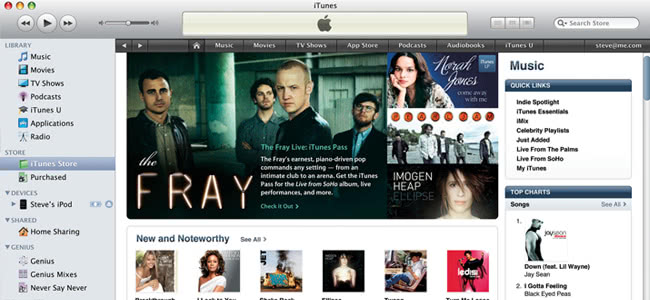We’re used to hearing about the ongoing battle for the future of music between physical and digital formats, a war that digital seems to be winning comfortably. But those in the digital space are also battling their own format war between downloading and streaming, with the results and consequences less than clear.
But as the likes of Spotify, Rdio, and Deezer look poised to take over the world there has been one notable absence – Apple – who with their iTunes store have become the world’s single biggest music retailer with combined revenue of over $10 billion each year across all product categories.
Now, according to the New York Times, Apple are set to dip their toe in the water of streaming, whilst at the same time protecting a business that contributes 7% of revenue of the whole company and is a cornerstone of their sales strategy for iOS devices such as iPhone and iPad.
Apple are reportedly in the early stages of negotiations with the major labels say sources close to the matter, and although the full scope of their plans remain unclear it seems the technology giant is focusing on a digital radio service similar to Pandora.
Although unavailable here in Australia, Pandora is a popular alternative to Spotify in the United States. But rather than stream 16 million songs on demand, Pandora lets users select their music tastes and creates a custom radio station stream that matches their preferences.
The sources, who wished not to be identified because the negotiations are confidential, claim that Apple’s service will take the form of a preinstalled app on Apple’s iOS devices and would connect to a user’s iTunes account to determine their music taste from prior purchases.
But Apple’s strategy differs somewhat from the established services who operate under limited licenses that limit the number of times songs from a particular artist can be played within an hour and the number of times songs can be skipped.
Instead Apple is seeking a new license directly with the record labels that would afford them more flexibility in using the music, perhaps to allow them to integrate it with their rumoured television device and plan to replace commercials with music.
Apple is also reportedly planning to integrate their iAds platform with the new service, similar to Spotify and Pandora that offer music streaming for free in exchange for listeners being served ads intermittently.
Whether Apple plans to share any of the advertising revenue with the labels or instead pay a licensing fee upfront is unclear. It is also unclear how much of the revenue will eventually flow on to artists.
Another option Apple are no doubt considering is a paid service. The idea is hardly original, users of both Pandora and Spotify can eliminate the ads on those respective services by paying a small subscription fee.
But some analysts are perplexed by the reports, wondering why Apple would be looking to get in on the internet radio business when it accounts for less than $1 billion a year in revenue.
“What’s in this for Apple?” asked Michael Pachter, an analyst at Wedbush Securities. “Pandora already does a great job, so does iHeartRadio, so does Last.fm. Why do we need another one?”
Others are calling for Apple to abandon their plans and instead focus on fixing the existing problems with iTunes such as the bloated interface, and outdated pricing that sees Australians pay nearly double for access to the same songs as Americans.
There’s also been growing discontent over the rights of your digital music purchases, with a rumour that Bruce Willis had considered suing iTunes over ownership pushing the issue into the mainstream.
An Apple spokesman, as well as representatives of Sony Music, EMI and the Warner Music Group all declined to comment. A spokesman for the Universal Music Group could not be reached.

































